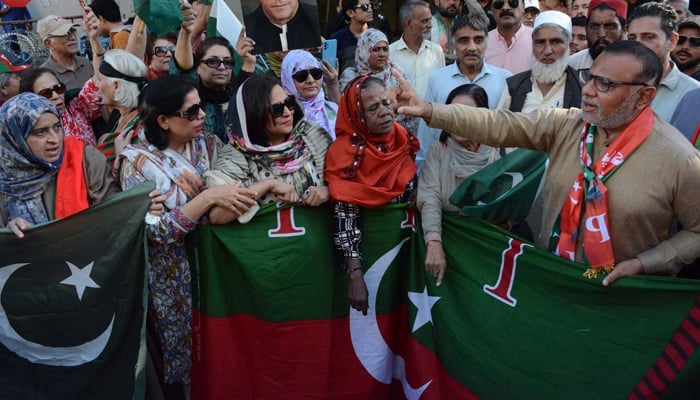Virtual politics
Every mainstream political party desires to hold maximum seats so that it is easier for them to manoeuvre in the corridors of power
Irrespective of who won or lost, if this election has given one single lesson to the political class all over Pakistan, it is this: you cannot ignore Millennials and Gen Z.
They are the elephant in the room and will be driving our politics for the years to come. While this huge youth bulge can be used as a force for good, it also has the potential to become a ticking time bomb against the pro-people, democratic section of this country.
To expand this point further, let’s look at the scenario we are in today after the polls. Unlike in Western democracies where leaders across the board call for uniting the nation after the polls – putting an end to their hostile and bitter election campaigns – here in Pakistan we are witnessing an extension of political polarization propelled by youth frustration.
When rhetoric, not policy development agendas, becomes the only currency in the political domain, then it is no surprise that such a country remains in turmoil. But this unrest is complemented by good catchy beats on social media.
The 2024 elections gave Pakistanis a feeling of deja vu, as these elections seemed a replay of the 2013 elections. The PTI has once again indicated that its politics will be centred on the poll results and has chosen the politics of confrontation by nominating Ali Amin Gandapur as the chief minister for Khyber Pakhtunkhwa.
A PTI TikTok star has also warned of more May 9-like attacks. The party’s social media dominance gives them the edge to be a narrative-maker; congratulations to them for that, but does this necessarily mean that they are right? The MQM-P begs to differ.
Our brand of politics differs from theirs because we believe that genuine political workers, irrespective of their political affiliation, will say that rigging allegations should be addressed through proper constitutional forums present in the country. Elections are sacred as are their results and the process that follows after it. While the courts decide the status of the held elections, the political government, in the meantime, needs to chart out a way to address Pakistan’s complex administrative challenges.
Every mainstream political party desires to hold maximum seats so that it is easier for them to manoeuvre in the corridors of power, but the reality on the ground today remains that no party can meet their desired numbers. So now we are left with two options: go with popular rhetoric, make sensational TikTok content, and introduce flashy street lingo like ‘warr gaya’ in Pakistan’s political lexicon or show political maturity by taking on governance challenges even if it may temporarily cost us our political capital because, at the end of the day, we have to do what our job demands.
To reiterate my point, the PTI or any other political parties’ objections must be addressed through proper channels, but the state cannot afford to remain at a standstill just because a populist party does not feel happy with the election results and uses social media to create havoc in society.
A strong government that is focused on policymaking, not dictated by Twitter trends, is needed today to face multifaceted domestic and international challenges that include an agreement with the IMF on the next economic package, climate emergency, employment, human resource building and changing geopolitical situation, especially on our north-western frontier.
It is exciting to see young people more involved in the electoral system; their participation is exactly what is needed to bring fresh ideas into practice, bring reforms, and tell the established Boomer elite that perhaps it is time for them to give some space to new faces because their policies are not working. But to get such things to work, the system needs to function; the void needs to be filled and governance needs to be done by those who have the mandate to do so. And for that, political activism on TikTok is not the right channel.
The PTI has formed its government in Khyber Pakhtunkhwa. We must congratulate them for that while being aware of the fact that it was the victimhood narrative, not governance, that gave them the electoral success.
Their choice for CM vindicates the claim that they have chosen to take their confrontation with the powers that be to the next stage.
Is it in the interest of the country? Rationale says no, but their toxic politics is sadly giving them the political dividends they desire.
Taking the government today at a time when strong challenges are present and a populist opposition backed by a social media wave is after the ruling parties is not an easy task. But our responsibility and commitment to our voters dictate us to do the hard job and ensure service delivery to our people.
It is more attractive to be a content creator plus political leader than to be a statesman but it is obvious which option people will choose if the choice is between these two.
May better sense prevail; may we heal as a nation, and may our youth channel its anger into constructive politics.
The writer is a senior member of Muttahida Qaumi Movement-Pakistan (MQM-P).
-
 'Bridgerton' Season 4: Showrunner Talks About Violet's Steamy Romance
'Bridgerton' Season 4: Showrunner Talks About Violet's Steamy Romance -
 John Tesh Recalls ‘uncomfortable’ Backlash Over ’70s Romance With Oprah Winfrey
John Tesh Recalls ‘uncomfortable’ Backlash Over ’70s Romance With Oprah Winfrey -
 Meghan Markle, Prince Harry Problem Was Not ‘work’ During Time With Royals
Meghan Markle, Prince Harry Problem Was Not ‘work’ During Time With Royals -
 Meta Strikes Multi-billion-dollar AI Chip Deal With Google: Will The New Collaboration Pay Off?
Meta Strikes Multi-billion-dollar AI Chip Deal With Google: Will The New Collaboration Pay Off? -
 Gracie Abrams Breaks Silence After Losing 2026 BRIT Award
Gracie Abrams Breaks Silence After Losing 2026 BRIT Award -
 Deon Cole Takes Swipe At Nicki Minaj In Mock Prayer During NAACP Image Awards Monologue
Deon Cole Takes Swipe At Nicki Minaj In Mock Prayer During NAACP Image Awards Monologue -
 Jennifer Garner Reveals The Actress Who 'carried Through Things'
Jennifer Garner Reveals The Actress Who 'carried Through Things' -
 Shamed Andrew ‘awful’ Time As Trade Envoy Is Laid Bare By Insider
Shamed Andrew ‘awful’ Time As Trade Envoy Is Laid Bare By Insider -
 Belgium Seizes Suspected Russian Shadow Fleet Tanker
Belgium Seizes Suspected Russian Shadow Fleet Tanker -
 Liza Minelli Makes Bombshell Claim About Late Mother Judy Garland’s Struggle With Drugs
Liza Minelli Makes Bombshell Claim About Late Mother Judy Garland’s Struggle With Drugs -
 Shipping Giant Maersk Halts Suez Canal, Bab El-Mandeb Sailings Amid Escalating Conflict
Shipping Giant Maersk Halts Suez Canal, Bab El-Mandeb Sailings Amid Escalating Conflict -
 Matthew McCoughaney Reveals One 'gift' He Achieved With Losing Nearly 50 Pounds
Matthew McCoughaney Reveals One 'gift' He Achieved With Losing Nearly 50 Pounds -
 'Scream 7' Breaks Box Office Record Of Slasher Franchise: 'We Are Grateful'
'Scream 7' Breaks Box Office Record Of Slasher Franchise: 'We Are Grateful' -
 Bolivian Military Plane Crash Death Toll Rises To 20
Bolivian Military Plane Crash Death Toll Rises To 20 -
 'Sinners' Star Blasts Major Media Company For 2026 BAFTAs Incident
'Sinners' Star Blasts Major Media Company For 2026 BAFTAs Incident -
 Inside Scooter Braun, Sydney Sweeney's Plans To Settle Down, Have A Baby
Inside Scooter Braun, Sydney Sweeney's Plans To Settle Down, Have A Baby




